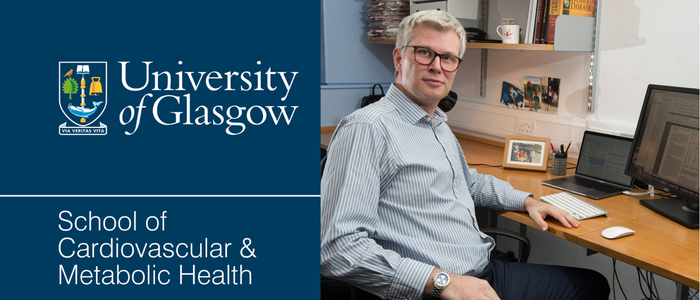Ninian Lang at SCMH @ESC Congress 2022
Published: 30 August 2022
Dr Ninian Lang's involvement at SCMH @ESC Congress 2022 where he delivered a lecture and produced 2 articles.

Ninian Lang's involvement at SCMH @ ESC Congress 2022:
1 - Lecture delivered: 'Cardiac dysfunction related to cancer therapy: diagnosis and prognostication.’
2 - Simultaneous publication of review article in Cardiovascular Research (also including Dr Claire Glen, Clinical Research Fellow, UoG) 'Mechanisms shared between cancer, heart failure, and targeted anti-cancer therapies’.
3. The results of the Cardiac CARE trial were presented by Dr Peter Henriksen (Univ. of Glasgow) 'Rationale and Design of the Cardiac CARE Trial: A Randomized Trial of Troponin-Guided Neurohormonal Blockade for the Prevention of Anthracycline Cardiotoxicity'. This is a randomised trial of troponin-guided neurohormonal blockade for the prevention of anthracycline cardiotoxicity. Ninian was NIHR/BHF grant co-applicant, led the trial in Glasgow. He is a senior author of the trial design paper, published in Circulation: Heart Failure.
Background:
Anthracyclines are effective cytotoxic drugs used in the treatment of breast cancer and lymphoma but are associated with myocardial injury, left ventricular dysfunction, and heart failure. Anthracycline-induced cardiotoxicity is highly variable in severity and without a proven therapeutic intervention. β-Adrenergic receptor blockers and renin-angiotensin-system inhibitor therapies have been associated with modest cardioprotective effects in unselected patients.
Methods:
The Cardiac CARE trial is a multicentre prospective randomized open-label blinded end point trial of combination β-adrenergic receptor blocker and renin-angiotensin-system inhibitor therapy in patients with breast cancer and non-Hodgkin lymphoma receiving anthracycline chemotherapy that is associated with myocardial injury. Patients at higher risk of cardiotoxicity with plasma high-sensitivity cTnI (cardiac troponin I) concentrations in the upper tertile at the end of chemotherapy are randomized to standard of care plus combination candesartan and carvedilol therapy or standard of care alone. All patients undergo cardiac magnetic resonance imaging before and 6 months after anthracycline treatment. The primary end point is the change in left ventricular ejection fraction at 6 months after chemotherapy. In low-risk nonrandomized patients, left ventricular ejection fraction before and 6 months after anthracycline will be compared with define the specificity of the high-sensitivity cTnI assay for identifying low-risk participants who do not develop left ventricular systolic dysfunction.
First published: 30 August 2022
Related Links
Altmetric Information
Altmetric information

